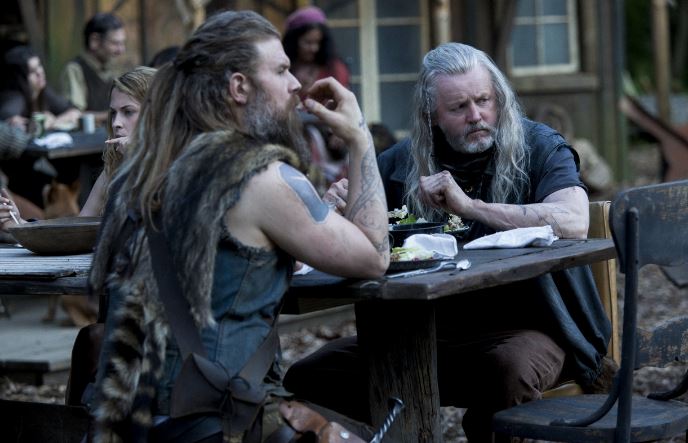 At a time when an armed group of yahoos have taken over government property in Utah and refuse to give it up, here’s a timely new series about a similar situation: An insular tribe of mountain folks who’ve inhabited their land for 200 years, who ignore an eviction notice from a big corporation that wants to blow it up and mine it.
At a time when an armed group of yahoos have taken over government property in Utah and refuse to give it up, here’s a timely new series about a similar situation: An insular tribe of mountain folks who’ve inhabited their land for 200 years, who ignore an eviction notice from a big corporation that wants to blow it up and mine it.
Officials didn’t count on how plucky and resourceful this unusual clan could be, including driving their ATVs into supermarkets to steal supplies. The big bearded Ferrell clan have their own internal rules and, judging from some of their dialog, their own language as well. At any rate, there will be friction with the Kentucky locals.
“Outsiders” (WGN, 9 p.m.) looks promising not only because of its unusual subject matter but also because of its casting, particularly Thomas M. Wright, the Australian actor so good in “The Bridge,” who returns here as a sheriff who has had a little history with the clan. David Morse, more used to playing cops and presidents than a big bearded cult leader (though it’s a couple of notches from his part as a kind of cult leader in last season’s “True Detective”) is compelling in his role as Big Foster, and they’re surrounded by some big talent in front and behind the cameras.
One of the biggest stars connected with the series is one who will never appear in it — producer Paul Giamatti.
“You might think I wouldn’t be interested in something like this,” Giamatti told reporters via satellite from New York at the TV Critics Association winter press tour this month, “but it has kind of genre elements to it that I actually am very drawn to, that I actually do like, as a viewer I like to watch.”
Giamatti, star of this season’s new “Billions” on Showtime, noted that he is mostly hired to be federal prosecutors or doctors or uptight radio management. “I don’t as an actor get to do a lot of stuff like this. I don’t get to play like badass guys, ATVs, a whole hell of a lot, but I do like watching that kind of thing.””
Giamatti says he knew the work of the writer Peter Mattei and in the script of “Outsiders,” ” I found a very appealing way to talk about things, the tensions between things like industry and the environment between the haves and have-nots, things like this..”
In researching clans like the fictional Farrells, Mattei says, “we really looked at everything from gypsy clans in eastern Europe to Native American tribes and tribes in the Amazon and so on to look at how is it that small clans of people can survive in the wilderness for as long as they have.
“I read about certain families that or groups that were living off the grid like the Jackson Whites in New Jersey or in the 18th, 19th centuries, the Ishmaelites in Indiana and Ohio,” Mattei says. “But basically, it really is a fantasy.”
For Morse, who has played cops and George Washington, playing the hulking tribal leader Big Foster was a change, and it took a while to get to his essence, he says.
Foster, he finally figured, was “a guy who was never allowed to be fully himself, and he’s just been rotting, basically, for a long time, drinking and partying and being kind of whatever he wants to be until he gets to be in power, which has been kept from him by his mother. But at the same time, he senses a threat from the world below.
“But,” Morse went on, “he understands things about the world below that nobody else does and understands there is a really danger to their way of life. He’s a man who really does love their way of life and feels a deep threat to what they’ve kept together and created together for a long time. So a lot of what he does comes out of that.”
As for the parallels to the actual standoff, Mattei says, “There’s some obviously some really big differences between the Farrell Clan and the people in Oregon. I actually don’t really know anything about it. But, I mean, the Farrells are holding on to land that they’ve been living on for over 200 years, so it’s basically their land as opposed to them trying to take someone else’s land. And they don’t really have a huge beef with the government. They just want to leave the way that they live and they’re going to have to fight the power in order to do that.
“So I think I hope that it resonates with people all over the place, whether they are fighting the power in Oregon, like those people, or whether they’re going to Burning Man and trying to live free in a sort of a small way that way,” he says, “I think that it’s got a lot of resonances.”